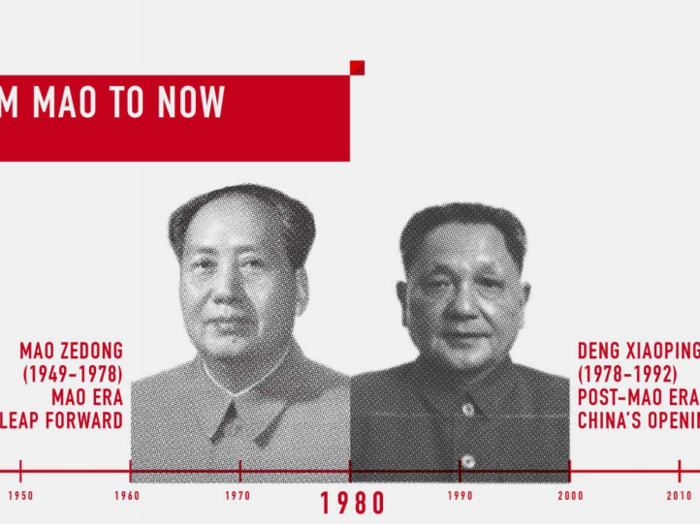
Landor described the generation gap between those born in China before 1976 (when former communist party leader Mao Zedong died) and those who were born after as a "generation chasm." Values, fears, tastes, and interests vary greatly between the two groups.
A 2015 study by Iconoculture revealed that the most important values for those born pre-1980 were "thrift," "practicality," "belief," "wisdom," and "reality." In stark contrast, the generation born after 1980 valued "convenience," "relaxation," "beauty," "image," and "friendship."

Western millennials like big brands that do one thing really well, such as Coca Cola, WhatsApp, Oakley, and Samsung.
However, a Brandlab study used by Landor showed that Chinese millennials think differently.
They want one brand that does everything. They care more about the number of different products the one brand can produce than the quality.
A Chinese millennial from the study, called Pair, said: "It should be all of life, so you can choose any part of the brand for your life." Another participant, Chritina, said: "People choose one company, one brand ..."


China has the biggest middle class in the entire world. 109 million Chinese people are defined in this way in Credit Suisse's 2015 wealth report. Landor suggested that rather than focusing on the super rich, who are already targeted heavily, more potential lies in marketing products to the middle classes.
Chinese companies like Alibaba and Tencent advertise from the bottom demographic up, unlike Western companies that tend to advertise from the top down.
For example, Chinese Internet giant Tencent, which owns popular messaging app WeChat, advertises on floor mats. While multi-billion dollar e-commerce company Alibaba sends teams to remote villages to show farmers how to access its products.


Landor suspects that many Western brands have an incorrect perception of Chinese women as "sweet and innocent." In China, 91% of urban adult women contribute to household income and 62% describe themselves as joint breadwinners, according to The Economist.
Celebrities with billions of followers, like Yang Lan (pictured,) Chen Lu Yu, and Yao Chen epitomize the strength of women in China. Also interesting is that Chinese women are more active on social networks (74%) than those in the US (46%), according to a report by Iconoculture.

Brands in China are lightening up. A relatively new phenomenon in Chinese advertising is the "Brain Boom." The concept is that all advertising needs to be eye-opening, whether positive or negative.

Last year, the Chinese governement announced that it had become fed up with advertisers describing every product as "the best." In an attempt to end the practice, it set in place a fine of up to 1 million yuan ($153,542) on advertisers who used superlatives.
The updated law made it illegal for adverts to say that any product is "the best,” "the highest" (meaning "supreme",) or “national level” (meaning "top level"). The full list of terms was not specified, however. Other superlatives could be deemed law-breaking by the State Administration of Industry and Commerce.
Many advertisers in China were not happy about the blanket ban and many decided to openly mock the new law. Didi Kuadi — China's version of Uber — ran a campaign saying it was "So fast it violates the advertising law," while Proya cosmetics ran a poster which said: "Sorry! Now we can only be the second-best."

The final piece of advice for Western brands trying to make it big in China was to pay attention to the Chinese language and culture, so as not to make embarrassing lost-in-translation mistakes.
Unfortunately for Nike in the example above, when combined, "Fa" and "Fu" translate as "Getting fat."
Here are some of the worst lost in translation mistakes from western brands in China.
 Saudi Arabia wants China to help fund its struggling $500 billion Neom megaproject. Investors may not be too excited.
Saudi Arabia wants China to help fund its struggling $500 billion Neom megaproject. Investors may not be too excited. I spent $2,000 for 7 nights in a 179-square-foot room on one of the world's largest cruise ships. Take a look inside my cabin.
I spent $2,000 for 7 nights in a 179-square-foot room on one of the world's largest cruise ships. Take a look inside my cabin. One of the world's only 5-star airlines seems to be considering asking business-class passengers to bring their own cutlery
One of the world's only 5-star airlines seems to be considering asking business-class passengers to bring their own cutlery Experts warn of rising temperatures in Bengaluru as Phase 2 of Lok Sabha elections draws near
Experts warn of rising temperatures in Bengaluru as Phase 2 of Lok Sabha elections draws near
 Axis Bank posts net profit of ₹7,129 cr in March quarter
Axis Bank posts net profit of ₹7,129 cr in March quarter
 7 Best tourist places to visit in Rishikesh in 2024
7 Best tourist places to visit in Rishikesh in 2024

Copyright © 2024. Times Internet Limited. All rights reserved.For reprint rights. Times Syndication Service.